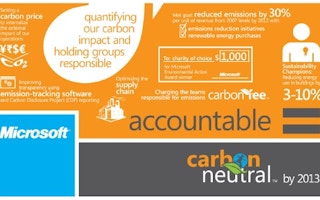Global software firm Microsoft announced this week a new target of going ‘carbon neutral’ by July, along with plans to set its own carbon price to drive home the message to its employees of the firm’s environmental impact.
Microsoft plans to achieve carbon neutrality for fiscal year 2013, which begins July 1 of this year, by making all its divisions worldwide accountable for their own emissions.
Carbon neutral companies reduce their greenhouse gas emissions impact to zero through a combination of reducing the carbon emissions they emit and purchasing carbon credits to offset any remaining emissions from their operations.
Carbon credits, such as those backed by the United Nations under its clean development mechanism scheme, are generated by renewable energy and other projects that reduce the amount of greenhouse gas emissions entering the atmosphere and are tradable in either voluntary or regulated markets.
In a May 7th company blog announcing the move, Microsoft chief environmental strategist Rob Bernard wrote that despite making good progress on reducing Microsoft’s carbon footprint in recent years, the firm’s management realised it needed to do more in the face of “the alarming scientific data on climate change and the urgent need for society to move to cleaner, reliable and more secure energy sources”.
“The goal is simple; to make the company’s business divisions financially responsible for the cost of their carbon emissions and drive even more focus on efficiency and environmental sustainability across Microsoft,” he added.
To provide incentives for all Microsoft divisions to keep their carbon emissions down, the firm is introducing a carbon price – based on current market prices for carbon credits - so that every department will have to pay directly for its carbon emissions from its own budget.
Carbon payments from Microsoft divisions will go to a central fund for the purchase of renewable energy and carbon certificates.
Mr Bernard noted that Microsoft has seen “broad buy-in for the carbon price” among managers, especially those whose departments depend on energy-hungry data centres.
There is growing criticism from environmentalists of the information technology (IT) industry’s rapidly growing carbon emissions from data centres.
Non-government organisation (NGO) Greenpeace has been monitoring Microsoft’s progress as part of its “Clean our Cloud” campaign, which aims to stop the IT industry from using fossil fuel-based energy to power data centres.
In an April statement on its website, the NGO praised Microsoft for prioritising data centre energy efficiency, but noted that a new data centre underway in coal-dependent Virginia will “very likely be powered by dirty energy.”
Greenpeace noted that specific details about the data centre were not yet unavailable, and encouraged the firm to use its influence on local utilities to increase the amount of renewable energy sources contributing to the electricity grid.
Microsoft has set other environmental targets for the next fiscal year, including reducing the amount of waste generated and water consumed, and minimising the carbon emissions from its supply chain.
Earlier this year, Microsoft enlisted environmental management software firm CarbonSystems to track and report on its environmental performance – including all of its direct operations such as data centres, offices, air travel and research and development - in more than 100 countries.
The environmental auditing software is internet-based, meaning that data from over 600 sites can be stored and analysed in a central place.
Mr Bernard noted that Microsoft’s carbon plan had already succeeded in increasing the firm’s focus on efficiency and clean energy, but that there was much work to do be done to refine the process.
“As we learn from this effort, we will share our lessons and our results with the industry,” he added.










